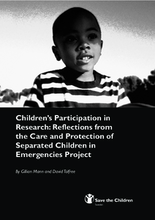This paper reviews the experience of involving children in the various case studies initiated by the Save the Children Alliance research initiative entitled Care and Protection of Separated Children in Emergencies. It examines the different ways in which children were involved – as informants, in the planning and management of the study, in the analysis of data, in respondent validation and finally as researchers or research assistants. Although the CPSC case studies provide examples of all of these different ways of involving children, none of them should be seen as the “right” way: rather emphasis is placed on defining clear objectives for children’s participation and defining their role according to what is appropriate and achievable in the context and circumstances. Particular emphasis is placed on the importance of using methods and techniques, which enable children to express their own issues and concerns and not just to respond to those raised by the adult researchers. The methodology and methods used are described and discussed. This paper offers an analysis of some of the factors that need to be taken into consideration in determining the children’s role in research. These include age, gender, time, the community and children’s experience of participation, children’s level of education and language skill, the presence of key gatekeepers and recognition of the diversity of children’s experiences. A range of ethical considerations are raised: the issue of informed consent of children and of their parents/guardians is discussed, and detailed consideration is given to the issue of distress and the need to deal appropriately with the results of children’s self-disclosure. Some discussion is offered on potential difficulties of children’s participation in communities in which the involvement of children is not considered appropriate, and on the importance of not raising unachievable expectations.
Finally, the question of adult-child power dynamics is explored and some measures are suggested to counteract the tendency for children to express “the right answer” rather than their honest opinions and ideas. A key message of this paper is that securing the participation of children in research can be both empowering and validating for children (and adults) as well as enriching for the research process and its findings. It was found that children’s views and experiences are often significantly different from those of adults, even when the latter believe that they are reflecting children’s viewpoints.
©Save the Children Sweden

